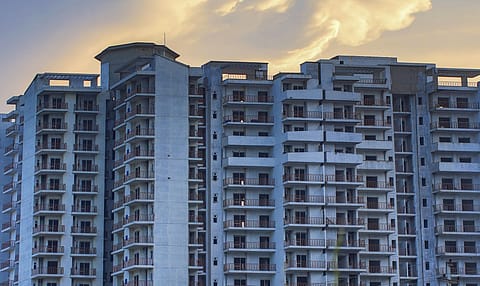How Mumbai's society redevelopment projects can unlock ₹1.3 lakh cr and 44,000 new homes by 2030
A total of 910 housing societies have signed development agreements (DA) since 2020, unlocking nearly 326.8 acres (1.32 mn sq m) of potential land area, says a Knight Frank report

By 2030, the current society redevelopment projects in the Mumbai (MCGM) region would add a total of 44,277 new homes at a value of ₹1,30,500 crore. The future society redevelopment projects are not only expected to unlock the residential market potential of the city but could also alter the skyline of Mumbai, according to a latest report by real estate consultancy Knight Frank.
The data shows a total of 910 housing societies have signed development agreements (DA) since 2020, unlocking nearly 326.8 acres (1.32 mn sq m) of potential land area, based on FSI utilisation norms and average unit sizes across the regions. The report notes that an estimated 1,60,000 societies were over the age of 30 and eligible for redevelopment.
The Western Suburbs, which include high-density population areas such as Bandra to Borivali, can expect to see the addition of 32,354 new homes, accounting for 73% of the total increase in stock from society redevelopment, while South Mumbai is expected to add 416 new housing units.
With the society redevelopment boom, the state government is also expected to generate about ₹6,500 crore in estimated revenues on account of the sale of the free sales from the society redevelopment in the next five years. Additionally, the free sales will generate Goods and Services Tax (GST) of estimated ₹6,525 crore in the same period.
"Society redevelopment in Mumbai is both inevitable and essential, given the city’s limited avenues of greenfield growth and the constant rise in demand. Redevelopment has significantly reshaped the dynamics of several micro-markets and remains a critical driver of Mumbai’s urban renewal. The free sale component from society redevelopment is expected to generate approximately ₹7,830 crore in stamp duty and another ₹6,525 crore as GST," says Shishir Baijal, Chairman & Managing Director, Knight Frank India.
Knight Frank believes the segment currently appears "overheated" and is fast reaching a point of inflexion. Rising prices have fuelled commitments that stretch well beyond sustainable limits, while society members’ expectations have grown disproportionately.
The report also underlines the dominance of the suburban market. Between 2020 and H1 2025, the Western Suburbs alone accounted for 633 out of 910 society deals, recording 70% of all agreements signed since 2020. Central suburbs added another 234 societies, pushing the suburban contribution to almost 96% Borivali, Andheri, and Bandra micro-markets emerge as the top three redevelopment hotspots, together contributing over 139 acres of activity.
Recommended Stories
Small plots dominate the activity, finds the report, adding that redevelopment remains concentrated in compact societies. "Over 80% of registered agreements since 2020 were for plots below 0.49 acres, highlighting the operational challenges of land aggregation in dense city precincts."
Despite smaller average plot sizes, the scale of transformation remains substantial, reflecting Mumbai's fragmented but deeply active redevelopment ecosystem, says the report. "Over the years, the deal size has also increased. This shift signals the emergence of larger society clusters, better aggregation efforts, and more efficient land utilisation, thus, hallmarking a maturing redevelopment ecosystem."
"Our assessment suggests that in markets below ₹40,000 per sq ft, developers should not share more than 30–35% of the total area with the society. This may increase to 35–40% where prices range between ₹40,000 and ₹60,000 per sq ft, and up to 50% in locations priced over ₹75,000 per sq ft. Beyond these thresholds, cash flows lose flexibility and projects become vulnerable."
The report also highlights that redevelopment is inherently a long-cycle endeavour, with projects typically spanning 8–11 years from initiation to final handover. Societies that began their journey in 2020 are only now entering construction or early delivery phases.
(INR CR)